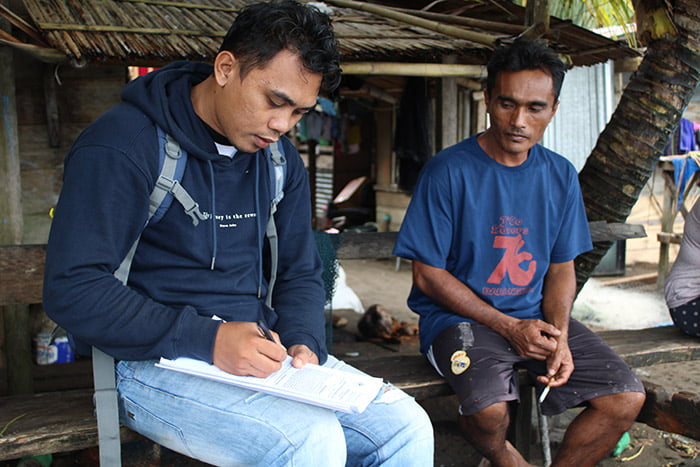Remote Training: Adapting to COVID-19 Pandemic
Conducting the initial Dugong Catch and Bycatch Questionnaire is an integral part of the Seagrass Ecosystems Services Project. Plans to conduct in-person capacity training had to be swiftly adapted following the COVID-19 pandemic.
This flexible, low-cost questionnaire is designed to generate standardized datasets, allowing us to assimilate a snapshot of dugong distribution and fishery overlaps, which in turn identifies hotspot areas where conservation action might be needed. Prior to conducting the survey, the local enumerators need to be trained on how to deliver the Questionnaire and how to input the data they collect.
The Seagrass Ecosystem Services Project was designed so that the Marine Research Foundation (MRF), a Technical Partner based in Malaysia, could provide face-to-face training to participants from all the national partner organizations. However, in February 2020 when the COVID-19 pandemic escalated to a point where national and international travel restrictions were imposed, the Project team had to rethink many aspects of implementation in order to keep the project moving forward, including: How can we deliver the Dugong Bycatch/Catch Questionnaire training to our National Partners if the technical experts cannot travel?
After consultation with MRF, the team decided that, with some adaptation, the training sessions could be delivered online. This was of course going to be quite a challenge and very different from the face-to-face sessions MRF were used to delivering.
The standard training modules were adapted, allowing more time for delivering the course via a series of six two-hour online sessions over a three-month period, as opposed to an all-day face-to-face session.
The Seagrass Ecosystem Services Project Partner in Indonesia, YAPEKA, was the first organization to start the Questionnaire training in April 2020. MRF’s Dr Nicolas Pilcher led the training sessions, explaining the key concepts and logic behind the questionnaire, discussing special data, holding trial interviews and finally, a session on data input. After the training finished in July 2020, the YAPEKA field team started collecting data from the Project sites in North Sulawesi and completed the data input by September 2020.
How can we deliver the Dugong Bycatch/Catch Questionnaire training to our National Partners if the technical experts cannot travel?
“We looked at environmental issues in villages and realized that not everything we thought is true and not everything we read on the internet is untrue. The questionnaire revealed that there are still turtle and dugong hunters in this region, using the meat used for the main course at wedding parties, but plenty of people also know that dugongs are protected by the law. By talking with the community, we got to know about their social condition and their perceptions. We collected baseline data and learnt how to try to fix things.” (Elisabeth Astari, Community Liaison, YAPEKA)
In the case of delivering remote training to YAPEKA, we faced a few other practical challenges. Due to the remote nature of the project sites in Indonesia, the internet connection was very unstable throughout, and the local lockdown regulations prevented the YAPEKA field team from accessing the target communities, causing a delay in delivering the Questionnaire.
Overall, despite the immense challenges the COVID-19 pandemic has presented to the Seagrass Ecosystem Services Project, a practical and replicable solution was ultimately found allowing the project to continue moving forward. This first experience with YAPEKA has provided us with useful learning which we will apply when we start delivering training to our other Project partners in Malaysia, Philippines, Thailand and Timor-Leste throughout the remainder of 2020.

Dugong Catch & Bycatch questionnaire training in Sangihe. (© Yapeka, Indonesia. 2020)